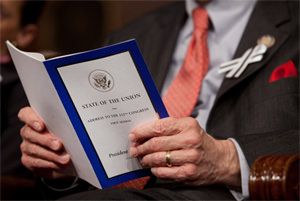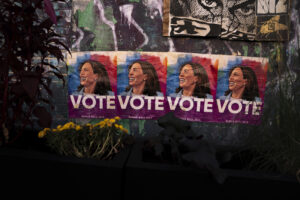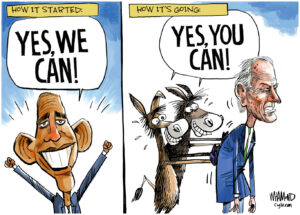Obama Backs Down From Gun Control Showdown
Eighteen years ago, the late Betty Friedan called her friend Ann Reiss Lane, a prominent Los Angeles civic activist. She was angry about the gun industry’s latest outrage—high-fashion ads marketing guns with grips made for a woman’s hand. Considering the events preceding this State of the Union, the president’s failure to talk about guns was inexplicable and unforgivable.
Eighteen years ago, the late Betty Friedan called her friend Ann Reiss Lane, a prominent Los Angeles civic activist. She was angry about the gun industry’s latest outrage—high-fashion ads marketing guns with grips made for a woman’s hand. Lane and Friedan brought together a few women and founded Women Against Gun Violence.
The group grew and has been instrumental in the passage of strong gun control laws in California and the city of Los Angeles. Last week, Lane watched President Barack Obama deliver his State of the Union address, waiting for him to say something about guns. “I waited through the entire speech, hoping,” she told me. “I had expected he would move forward about the violence in the country, not only violent speech but violent action. I was totally disappointed, and I was a big Obama supporter.”
Senior White House adviser David Plouffe told NBC, “The president has been clear about his position on the assault weapons ban. … He’s going to address this.” But the timing and venue of that event are unclear. I hope the statement is made in an arena, on prime-time television, instead of one of those canned weekend speeches everyone ignores or in a post on the White House website.
Considering the events preceding this State of the Union, the president’s failure to talk about guns was inexplicable and unforgivable.
The parents and brother of Christina Green were in the gallery, seated with Michelle Obama. The child was one of six people killed by the Tucson gunman who also shot Rep. Gabrielle Giffords through the head.
The day before the State of the Union speech, The New York Times reported that 13 police officers had been shot in the United States in the previous five days, four fatally. “I can’t remember this many shootings happening in such a short period of time,” said Chuck Wexler, executive director of the Police Research Forum. “Many of these criminals are outgunning our police officers,” Craig W. Floyd, chairman of the National Law Enforcement Officers Memorial Fund, told the Times. “We’re seeing criminals with high-velocity clips on their guns.”
A few days before the speech, a shooting in Gardena High School, just outside Los Angeles, especially illustrated the escalation of the American gun mania. A 15-year-old boy put a loaded handgun in his backpack. He took the gun to school and set the backpack down on a desk. The gun fired from the backpack, the bullet blasting through a boy’s neck and the head of a 15-year-old girl. The bullet missed her brain, but Dr. Gail Anderson, chief medical officer of UCLA Harbor Medical Center, said that shock waves from it injured her brain.
The girl was released from the hospital last week, and her parents have told the staff they do not want to talk to reporters. She may face a tough recovery, like the one facing Rep. Gabrielle Giffords. Let their painful steps back be a reminder of the cost of a violent society.
Amid all this carnage, why didn’t President Obama say something about violence?
“I guess he was making his conciliation speech, and he is afraid of the NRA [National Rifle Association], and he doesn’t have the support of the Middle Western or Southern Democrats,” Ann Lane said. “It would have been a risk for him to speak out. But I think this would have been a time to take the risk.”
As she talked to me on the telephone, Lane’s voice reflected the combination of disappointment and determination of a crusader whose cause zooms into public attention in connection with a bloody event—Virginia Tech or Tucson—and then slips back to its usual place at the bottom of the news media’s priority list.
Back in 1993, when Women Against Gun Violence was founded, Betty Friedan was teaching at the University of Southern California and Lane was working with Friedan’s class. It was a particularly tense time in a city that had been hit by a huge riot the year before. Friedan figured Lane, who had been on the Los Angeles fire and police commissions, had the credentials to organize the group. It started small. I attended an early meeting in Lane’s living room while I was a columnist for the Los Angeles Times; I was the only reporter there. But the group grew and worked with other anti-gun organizations. Its campaign helped influence a liberal state Legislature and Los Angeles City Council to pass a number of gun control laws.
I pointed out to her that the laws hadn’t prevented the two kids at Gardena High School from being shot. “We have great traffic laws, but they still don’t stop people from being involved in traffic accidents,” she said. “In 1994, homicides in L.A. city were over 1,000,” she said. “Last year they were under 300. We helped.”
Gun control will be a hard sell in a Congress that is heavily lobbied by gun advocates, supported by the gun industry. In the first nine months of 2010, the National Rifle Association spent more than $2 million for lobbying, according to OpenSecrets.org, part of the Center for Responsive Politics. Four other pro-gun groups spent hundreds of thousands of dollars more.
The gun companies —to use the phrase of their valued gangster customers—are the “shot callers” in this battle, along with the NRA trying to block gun control in Congress. So far, the president has backed down, leaving the fight to outnumbered gun control advocates like Ann Reiss Lane and to outgunned police officers on the streets.
Dig, Root, GrowThis year, we’re all on shaky ground, and the need for independent journalism has never been greater. A new administration is openly attacking free press — and the stakes couldn’t be higher.
Your support is more than a donation. It helps us dig deeper into hidden truths, root out corruption and misinformation, and grow an informed, resilient community.
Independent journalism like Truthdig doesn't just report the news — it helps cultivate a better future.
Your tax-deductible gift powers fearless reporting and uncompromising analysis. Together, we can protect democracy and expose the stories that must be told.
This spring, stand with our journalists.
Dig. Root. Grow. Cultivate a better future.
Donate today.






You need to be a supporter to comment.
There are currently no responses to this article.
Be the first to respond.